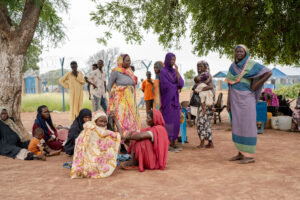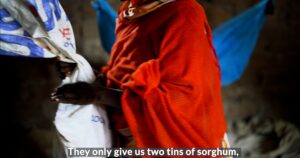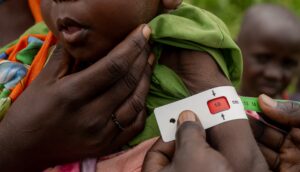By Matik Kueth
In the sweltering fields of Wedweil Refugee Camp, Northern Bahr el Ghazal State (NBGS), hunger is more than the absence of food.
It is a shadow that stalks every family, stealing childhoods, laughter, and hope, as those who fled Sudan’s war now face a new, silent enemy: starvation.
Established in 2023, Wedweil was meant to host Sudanese refugees and South Sudanese returnees fleeing conflict in Sudan.
Today, it shelters 26,907 people, a fraction of 1.2 million Sudanese refugees and South Sudanese returnees in South Sudan, according to the United Nations.
However, the food rations provided by humanitarian agencies last barely two weeks, leaving families desperate.
In the camp, there are no global cameras, no headlines; only mothers and children struggling to survive.

Mothers sit under trees in quiet despair, their thoughts consumed by hunger. [Matik Kueth, King Media].
In an interview with King Media on Monday, Zainab Ali Adam, a mother of four, who fled Nyala after war tore her family apart in 2023, face a daily struggle to keep her children alive in Wedweil.
“My husband and son were shot on the third day of the war. The Rapid Support Forces came and attack us in Hai Al-Wadi Sharik and two mortar fell in our house and my son and father were hurt,” Adam stated.
She added, “No organization is supporting even the food we are not getting leave alone solving my child’s condition.”
For Adam, the struggle is relentless, with every day bringing the impossible choice; feed the children or spend what little they have on medicine, water, or shelter.
“They only give us two tins of sorghum, and they no longer pay money. Half crystal of oil, tin of tomato paste, like this, and a nickel cup like for lentil per person and small salt. Nothing else,” she said.
Forty nights until distribution day
Kheltum Yunis, 38, a mother of five children, fled Nyala, Southern Darfur, after her husband was killed in 2023.
She arrived in Wedweil with her five children carrying nothing but hope, but that hope faded as the camp was engulfed in hunger.

A photo depicting a small portion of sorghum distributed to refugees in Wedweil [Photo: Matik Kueth, King Media].
“Our children who arrived healthy from Sudan are now malnourished. Forty mornings until distribution day, and after forty days, distribution will not start with you. If we take size 3,4,5 it doesn’t reach in mid-month,” Kheltum stressed.
Kheltum Clip 1……………..
Yunis once ran a restaurant, feeding her family with dignity, but now sells her last clothes to keep them alive.
“I used to have restaurant in old market in January, 2024. But in January my restaurant got burnt and things were stolen. Now, we are left with nothing,” she lamented.
“I have only one sari (Lawa), that I wash and wear it in the morning when I am stepping out. Because I have sold out all belongings for sake of my children. And still, we are facing worse suffering than this,” she explained.
For young children, the consequences are dire, as malnutrition, disease, and trauma take a heavy toll while mothers struggle to feed their families relying solely on inconsistent aid.
Acien Ajak, 27, a South Sudanese returnee, struggles to care for her four children daily.
Her youngest son has been battling malnutrition since he was just four months old.
“My son has been suffering from malnutrition since he was 4 months, now he has 2 years with this situation, it’s not easy he don’t eat even, he only takes milk,” she said.
Though her other children are healthier, the lack of assistance in the camp leaves her desperate and dismayed.
“No assistant has been given to children in this camp, since we came to this camp, children have not received any assistants,” she bemoaned.

Acien’s child undergoes malnutrition screening in Wedweil [Matik Kueth, King Media].
For children like a 14-year-old Fuaza Abdurrahman Anil, the toll is physical and emotional.
He recounted how bombs fell in his home in Sudan, leaving him wounded.
“We were just in the house like these two bombs falling inside our house. I got wounded here, but they took us to the hospital. My hand still paints me sometimes, and it even brings Pus. It’s painting me sometimes, especially when it rains,” he stressed.
But life in the camp is far from safe, lamenting food shortages in the camp and emphasizing the need for aid agencies to assist.
“Here they only give us two bushels) Malwa and a cup of lentils, one bottle of oil, one spoon of salt, we need them to increase these things,” he emphasized.
Children in the camp with no access to education, as hunger steals their future. [By Matik Kueth, King Media].
Meanwhile, Ali Ibrahim, 14, survives on little more than Asida (Posho) daily with no stew.
“Before the crisis in Sudan, things were ok, you had your breakfast in the morning and went to school, and they gave you your daily school expenses, and you ate there at school, you ate again after you came back from school. No school here and things are different here,” he lamented.
As hunger and despair worsen, Zainab appeals to Al-Burhan to intervene as starvation grips Wedweil.
“My prayer is to Al-Burhan to pity our condition. Let him [Burhan] come and see with his own eye and repatriate us and take us anywhere, even if taking me back to Sudan,” she emphasized.
Aid cuts deepen the crisis
In Wedweil, hunger has become the fiercest enemy, stealing childhoods, breaking families, and leaving mothers with unbearable choices.
With minimal aid and no path to recovery, refugees face a daily battle to survive, trapped between the war they fled and the starvation they cannot escape.
A humanitarian worker in Northern Bahr el Ghazal, who spoke on condition of anonymity, described the situation as “a crisis inside a crisis,” saying that food rations have fallen drastically due to global funding gaps.
“The food rations have been reduced badly, and it’s affecting the people in the camp a lot. People are getting less than a third of what is needed to keep people alive. So, mothers had to sometimes skip some days so that their child could eat,” she stated.
According to the World Food Programme (WFP), funding shortfalls have forced ration cuts in several camps, including Wedweil.
The agency cautioned that thousands of refugees and returnees across South Sudan are now surviving on barely half of the daily calories required for basic health.
The camp’s plight reflects a wider crisis affecting both refugees and returnees across the country, a humanitarian emergency that needs urgent attention from the government, aid agencies, and the international community.



![A photo of Wedweil Refugee Camp Signpost in Northern Bahr el Ghazal State [Matik Kueth, King Media].](https://kingmediassd.com/wp-content/uploads/2025/10/A-photo-of-Wedweil-Refugee-Camp-Signpost-in-Northern-Bahr-el-Ghazal-State-Matik-Kueth-King-Media-1170x780.jpg)